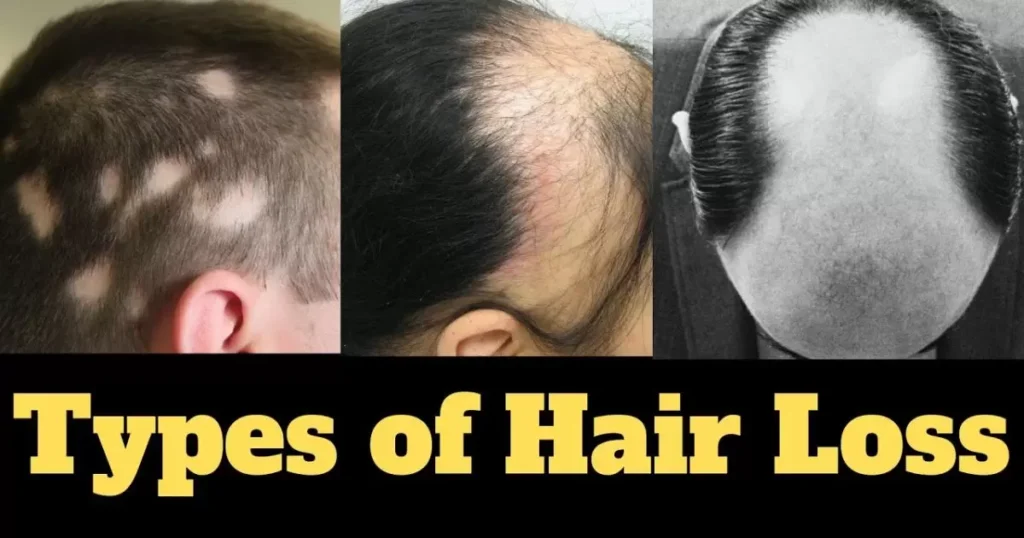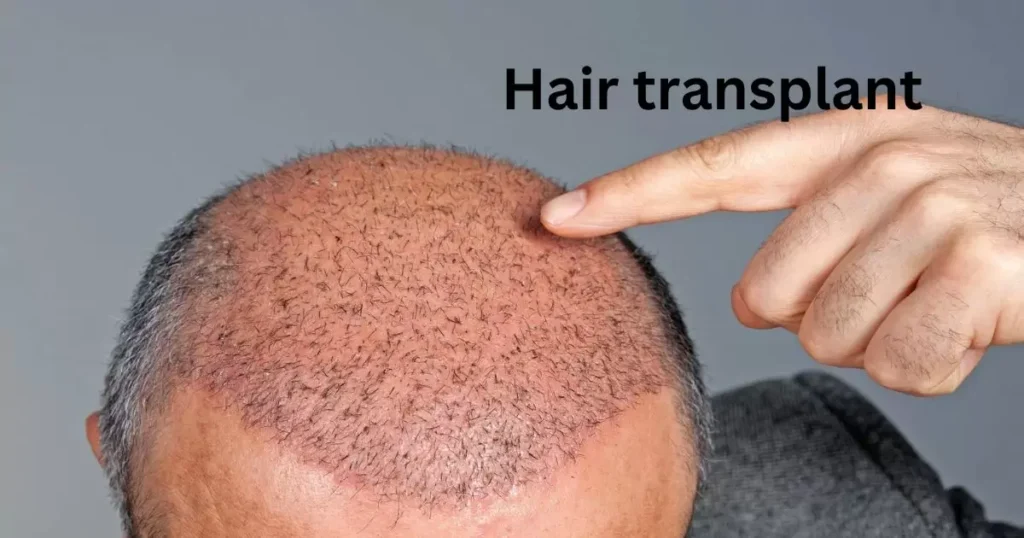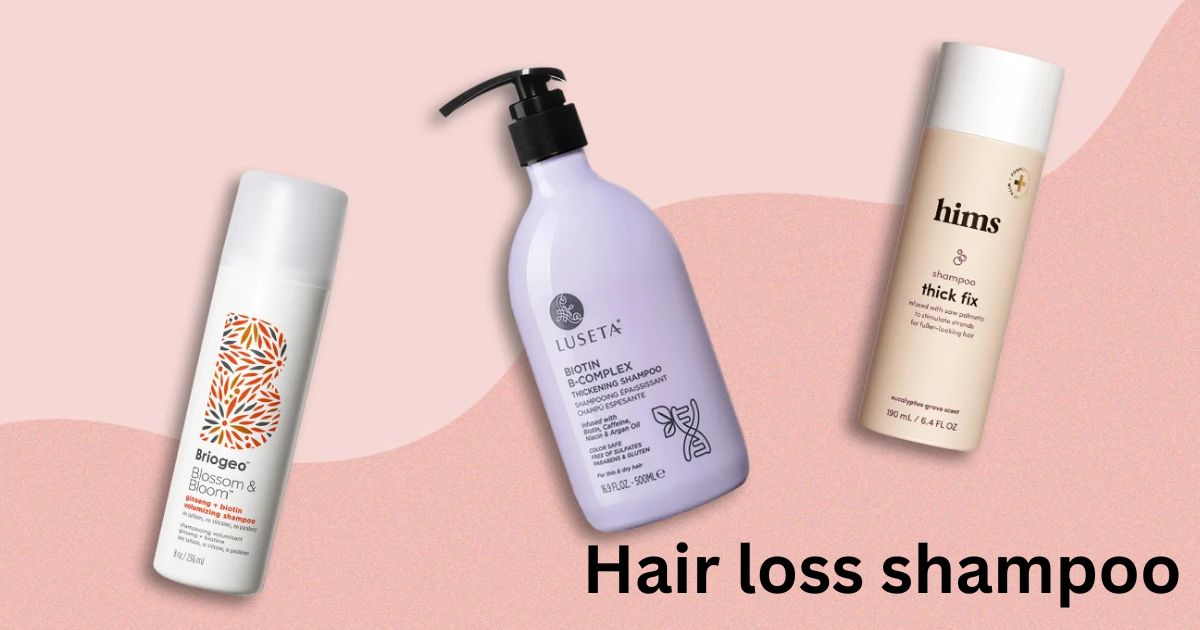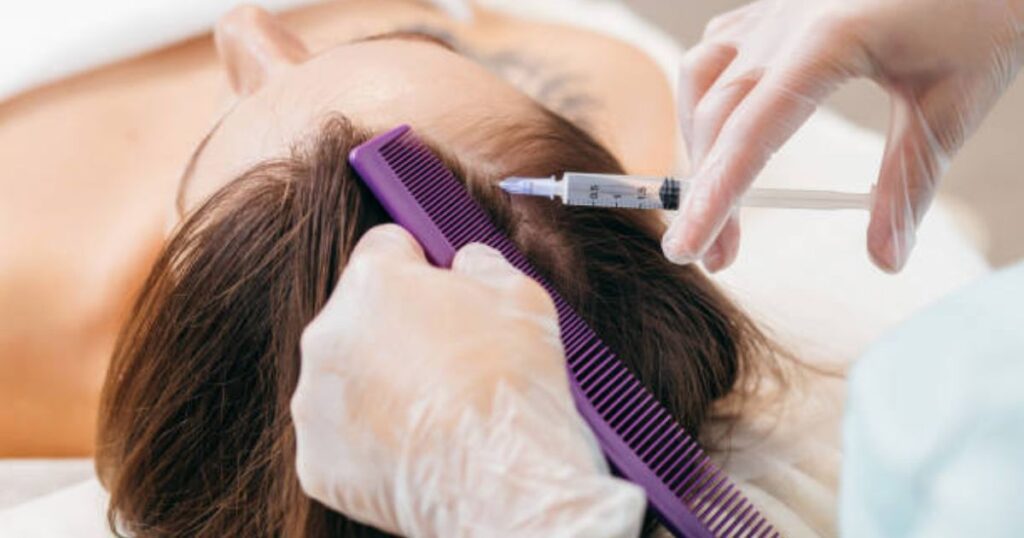Lifestyle changes, a balanced diet, and proper hair care can contribute positively. Seeking advice from healthcare professionals for underlying health issues, hormonal imbalances, or nutritional deficiencies is crucial.
Discover the key to combating women’s hair loss and regaining confidence. Uncover effective solutions for what helps women’s hair loss, empowering you on your journey to healthier, fuller hair. Embark on a journey to discover what helps women’s hair loss unraveling secrets to healthier, luscious locks and boosting confidence.
To address women’s hair loss, maintaining a balanced diet rich in nutrients is crucial. Adequate iron, vitamins, and proteins support hair health. Consult a healthcare professional to identify and address hormonal imbalances or underlying medical conditions.
Different types of hair loss

Various types of hair loss exist, each with distinct causes and characteristics. Alopecia areata, Androgenetic alopecia, Telogen effluvium, and Traction alopecia are different types of hair loss. Understanding these different types helps in accurate diagnosis and appropriate treatment.
- Alopecia areata: Alopecia areata is a condition causing unpredictable hair loss in specific areas. The immune system mistakenly attacks hair follicles, leading to bald patches. While it varies in severity, treatment options aim to stimulate hair regrowth and manage the condition.
- Androgenetic alopecia: Androgenetic alopecia, commonly known as pattern baldness, is a genetic condition leading to hair thinning and loss. It affects both men and women, with a distinct pattern of hair recession or thinning at the crown and temples.
- Telogen effluvium: Telogen effluvium is a temporary hair loss condition triggered by factors like stress, illness, or hormonal changes. Hair follicles enter a resting phase, causing increased shedding. With time and resolution of the underlying cause, hair typically regrows.
- Traction alopecia: Traction alopecia is hair loss caused by prolonged tension on the hair roots. Often resulting from tight hairstyles like braids or ponytails, it weakens the hair follicles. Prevention involves avoiding constant pulling to maintain healthy hair.
Types of alopecia
Alopecia comes in various types, such as alopecia areata causing localized hair loss, androgenetic alopecia leading to pattern baldness, and alopecia universalis resulting in total body hair loss. Understanding these types is crucial for appropriate diagnosis and treatment.
- Alopecia Areata: Alopecia areata manifests as patchy hair loss, often on the scalp but can affect other areas. It’s an autoimmune condition where the immune system mistakenly attacks hair follicles, leading to sudden, unpredictable bald patches.
- Androgenetic Alopecia: Commonly known as pattern baldness, androgenetic alopecia is a hereditary condition that causes hair thinning and loss. It often follows a specific pattern, such as a receding hairline or thinning at the crown.
- Alopecia Totalis and Universalis: Alopecia totalis results in complete hair loss on the scalp, while alopecia universalis extends to the entire body, including eyebrows and eyelashes. These severe forms of alopecia are less common and can profoundly impact an individual’s appearance.
- Scarring Alopecia: Scarring alopecia, or cicatricial alopecia, involves inflammation that destroys hair follicles and replaces them with scar tissue. This irreversible form of hair loss can result from various conditions, including autoimmune disorders or infections.
Hormone therapy
Hormone therapy involves using medications to adjust or replace hormones in the body. It is commonly utilized to address imbalances in hormone levels, often associated with conditions such as menopause, certain cancers, or gender transition. By regulating hormone levels, this therapy aims to alleviate symptoms, manage health conditions, or induce desired changes.
For example, hormone replacement therapy (HRT) in menopause helps alleviate symptoms like hot flashes. In cancer treatment, hormone therapy be used to slow or stop the growth of hormone-sensitive tumors. It plays a vital role in enhancing well-being and addressing specific health concerns related to hormonal fluctuations.
Hair transplant

Hair transplant is a surgical procedure aimed at addressing hair loss by relocating hair follicles from one part of the body, often the back or sides of the scalp, to the areas with thinning or no hair. This procedure can provide a lasting solution for those experiencing pattern baldness or hair thinning.
It involves extracting individual hair follicles and transplanting them into tiny incisions in the recipient area. The transplanted hair then continues to grow naturally. While results can vary, hair transplant surgery is a widely accepted and effective option for restoring a fuller head of hair.
Use hair loss shampoos

Hair loss shampoos are formulated to address the common issue of hair thinning and loss. These specialized shampoos often contain ingredients like minoxidil, biotin, or ketoconazole, which aim to promote hair growth, strengthen follicles, and prevent further shedding. While results vary, regular use of these shampoos can contribute to healthier-looking hair.
It’s essential to choose a product that suits your specific needs and hair type. This consulting with a healthcare professional is advisable for a comprehensive approach to managing hair loss, as shampoos alone do not address all potential underlying causes.
Eat a nutritious diet
Eating a nutritious diet is essential for maintaining good health. It involves consuming a variety of foods that provide the necessary nutrients, such as vitamins, minerals, proteins, and carbohydrates. A balanced diet includes fruits, vegetables, whole grains, lean proteins, and dairy products. These foods fuel our bodies, support growth, and boost our immune system.
Avoiding excessive intake of processed foods, sugary snacks, and high-fat meals is crucial for overall well-being. By making mindful food choices, individuals can promote better digestion, energy levels, and weight management. Remember, a nutritious diet is a cornerstone for a healthy and vibrant life.
Scalp massage
Scalp massage is a simple and delightful practice that involves gently manipulating the scalp to promote relaxation and well-being. Using fingertips or specialized tools, this soothing technique stimulates blood circulation, which enhances hair health. The rhythmic movements alleviate tension, reduce stress, and provide a calming sensation.
Regular scalp massages are believed to contribute to a healthier scalp and hair, potentially reducing dryness and promoting natural shine.D]sionally at a salon or self-administered at home, a scalp massage offers a pleasant break from daily routines, leaving individuals refreshed and rejuvenated.
A hair lotion containing minoxidil
Minoxidil, a key ingredient in many hair lotions, is known for promoting hair growth and preventing hair loss. This topical solution is widely used to address issues like thinning hair and receding hairlines. Applying the lotion directly to the scalp stimulates blood flow, leading to improved follicle function.
Minoxidil is believed to widen blood vessels, allowing more oxygen, blood, and nutrients to reach the hair follicles, fostering a healthier environment for hair growth. Regular use of a hair lotion containing minoxidil can contribute to thicker and fuller hair, making it a popular choice for those seeking to enhance their hair density and combat baldness.
Hair loss treatments
Hair loss treatments are diverse and aim to address the various causes of hair loss. Over-the-counter options like minoxidil are popular for stimulating hair growth. Prescription medications like finasteride can help reduce hair loss by blocking the hormone responsible. Platelet-rich plasma (PRP) therapy involves injecting a patient’s blood into the scalp to stimulate hair follicles.
Surgical options like hair transplant surgery can also be considered for more severe cases. Lifestyle changes, such as a balanced diet and stress management, play a crucial role in maintaining healthy hair. Consultation with a healthcare professional is essential to determine the most effective treatment for individual cases.
Ways to cope with hair loss
Dealing with hair loss, including understanding the causes of female hair loss, can be challenging, but there are various ways to cope and boost your confidence. Firstly, consider adopting a healthy lifestyle with a balanced diet rich in vitamins and minerals, as this can play a crucial role in maintaining hair health. Gentle hair care practices, such as using mild shampoos and avoiding excessive heat styling, are also essential factors to promote overall hair well-being.
- Nutritional Support for Healthy Hair: A well-balanced diet with essential vitamins and minerals supports hair health. Incorporate foods rich in iron, biotin, and omega-3 fatty acids to promote hair growth and strength, helping cope with hair loss.
- Gentle Hair Care Practices: Adopting a gentle hair care routine minimizes stress on fragile strands. Choose mild shampoos, avoid excessive heat styling, and use wide-tooth combs to prevent breakage, contributing to better hair resilience.
- Consulting with Healthcare Professionals: Seek advice from healthcare experts to identify and address any underlying medical conditions leading to hair loss. Professional guidance ensures a comprehensive approach to managing the issue, potentially slowing down or reversing the process.
- Stylish Solutions and Self-acceptance: Explore fashionable options like hats, scarves, or wigs to embrace diverse looks confidently. Experimenting with different hairstyles and practicing self-acceptance fosters a positive mindset, empowering individuals to navigate the emotional aspects of coping with hair loss.
Connect with a doctor
Connecting with a doctor is vital for maintaining good health. Through various means like telemedicine or in-person visits, patients can consult healthcare professionals to discuss symptoms, receive medical advice, and obtain necessary prescriptions. Online platforms facilitate easy access, allowing individuals to connect with a doctor from the comfort of their homes.
This fosters timely medical interventions and promotes overall well-being. Seeking preventive care or addressing specific health concerns, the ability to connect with a doctor ensures personalized guidance and support. In today’s digital age, connecting with a doctor has become more convenient, ensuring healthcare is accessible to a broader audience.
FAQs
What causes women’s hair loss?
Women’s hair loss can be triggered by factors such as hormonal changes, genetics, medical conditions, or stress.
Are there any effective treatments for women’s hair loss?
Yes, treatments like minoxidil, prescription medications, and low-level laser therapy have shown effectiveness in promoting hair regrowth for some women.
Can nutritional changes help with women’s hair loss?
A balanced diet rich in vitamins and minerals, particularly iron and biotin, can contribute to healthier hair, but it’s essential to address underlying causes as well.
Is there a link between women’s hair loss and styling practices?
Excessive use of heat, tight hairstyles, and chemical treatments can contribute to hair loss, so it’s advisable to adopt gentle styling practices to minimize damage.
How can stress impact women’s hair loss, and what can be done about it?
High-stress levels can contribute to hair shedding. Managing stress through relaxation techniques, exercise, and self-care helps reduce its impact on hair loss.
Conclusion
Addressing women’s hair loss involves a multifaceted approach that includes maintaining a balanced diet rich in essential nutrients, practicing stress management techniques, and using suitable hair care products. Consulting with a healthcare professional or dermatologist can provide personalized insights and potential medical interventions.
Adopting a gentle hair care routine, avoiding excessive heat or chemical treatments, and being mindful of hormonal changes can contribute to overall hair health. Embracing a holistic approach to well-being is key in supporting women experiencing hair loss, fostering both external and internal factors for optimal results in promoting hair growth and overall confidence.


Pingback: What causes female hair loss?